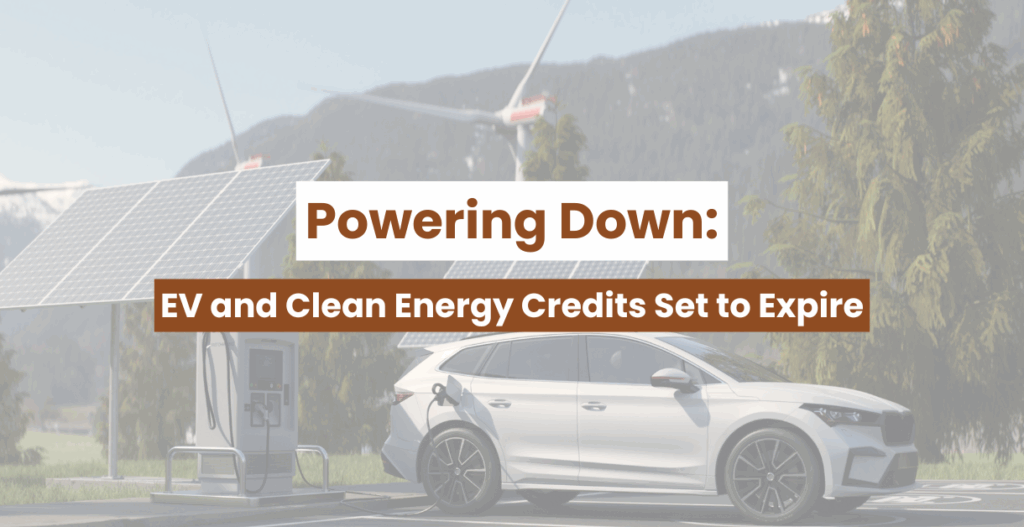

Heather Marcello
Heather joined Basswood Counsel as a Law Clerk and Administrator in 2022. She works on our tax team assisting foreign tax clients with their U.S. tax filing obligations and estate planning clients with their long-term estate planning goals.
This is a follow-up to our previously published articles, where we introduced the major provisions of the OBBBA impacting individual taxpayers.
The One Big Beautiful Bill Act (OBBBA) introduces sweeping changes to federal tax credits for electric vehicles (EVs) and clean energy technologies. These changes significantly alter the landscape for consumers, businesses, and developers planning to invest in sustainable technologies.
Electric Vehicle Tax Credits: Expiring Soon
The OBBBA accelerates the termination of several key EV-Related tax credits:
- New Clean Vehicle Credit: The previous $7,500 maximum credit for purchasing an electric vehicle (EV) until 2032 is now set to expire on September 30,2025
- Used Clean Vehicle Credit: The previous $4,000 maximum credit for purchasing a used EV priced under $25,000 will also expire on September 20, 2025.
- Commercial Clean Vehicle Credit: The previous $40,000 maximum credit for the purchase of qualifying vehicles will expire on September 30, 2025.
- EV Charging Infrastructure Credit: This credit was previously extended to 2032 but will now expire on June 30, 2026.
To qualify for these credits, vehicles must be purchased and placed in service by the respective deadline. The law also introduces stricter documentation requirements, such as a Time of Sale Report from the dealer.
Clean Energy Tax Credits: Accelerated Phase-Outs
The OBBBA significantly modifies the Investment Tax Credit (ITC) and Production Tax Credit (PTC) for clean energy projects:
- Wind and Solar Projects: To qualify for these credits, projects must begin construction by July 4, 2026, or be placed in service by December 31, 2027. Projects starting after this window will be ineligible for these credits.
- Other Technologies (e.g., storage, geothermal, hydropower): Full credit eligibility remains until 2033. However, they will phase down to 75% in 2034, 50% in 2035, and will eventually end in 2036.
- Residential Clean Energy Credit and Energy Efficient Home Improvement Credit: These credits were put into place to help homeowners cover the cost of installing renewable energy systems like solar panels or making energy efficient improvements like installing new windows and were worth up to 30% of the cost of new, qualified clean energy technologies and improvements. They were previously extended through 2032, but both credits will now end for expenditures made and property placed in service after December 31, 2025.
Foreign Entity of Concern (FEOC) Restrictions
The Act introduces FEOC rules that disqualify projects from receiving tax credits if they involve entities or materials from certain foreign countries (e.g., China, Russia, Iran, North Korea). These rules apply to ownership, supply chains, and material sourcing. A Material Assistance Cost Ratio (MACR) test will be used to determine eligibility based on the percentage of costs from non-prohibited sources. These rules apply to most clean energy credits, including ITC, PTC, and advanced manufacturing credits.
Clean Fuel Production Credit and Advanced Manufacturing Investment Credit
While several clean energy credits are now set to expire much sooner than expected, the OBBBA did extend the Clean Fuel Production Credit. This credit provides financial incentives for the production and sale of clean transportation fuels with low lifecycle greenhouse gas emissions. Previously set to expire in 2027, it is now extended through 2029. However, there are stricter sourcing rules and the bonus for sustainable aviation fuel was eliminated.
The OBBBA also increased the Advanced Manufacturing Investment Credit from 25% to 35% for qualified investments in advanced manufacturing facilities, such as those for semiconductors. However, there are some limitations. This increase is only for property placed in service after December 31, 2025, and only if construction of the facility begins before January 1, 2027. The OBBBA marks a significant shift in U.S. clean energy and EV policy. While it preserves some incentives for clean fuels and advanced manufacturing, it accelerates the sunset of many consumer-facing credits and imposes new restrictions on foreign involvement. Stakeholders should act quickly to take advantage of remaining credits and prepare for a more complex compliance environment soon.
This article is the sixth installment in our focused content series examining the One Big Beautiful Bill Act and its implications for individual taxpayers, estate planning, and businesses.
- The One Big Beautiful Bill Act: What It Is and How It Affects Individuals
- The One Big Beautiful Bill Act and Its Impact on Estate and Gift Taxes
- The One Big Beautiful Bill Act: What It Is and How It Affects Businesses
- The One Big Beautiful Bill Act: How SALT and QBI Deduction Changes Affect Taxpayers
- Navigating the One Big Beautiful Bill Act: Key Tax Updates for Individuals